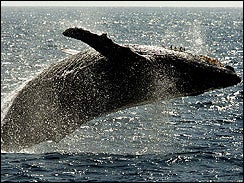Humpback Whales More Social Than Originally Thought
Scientists who long thought humpback whales preferred to remain solitary denizens of the deep will have to revisit their assumptions. Associations between baleen whales were thought to consist of short and unstable associations. But a study appearing in the journal Behavioral Ecology and Sociobiology finds just the opposite to be true.
Researchers who studied individual humpback whales in the Gulf of St. Lawrence between 1997 to 2005 found evidence of years-long associations between some female whales as the same individual humpbacks reunited during the summer feeding season. What's more, they found that the whales which maintained the longest associations also registered the highest reproductive output.
Some mature females forged bonds lasting as long as six years. The friendships between females and males never matched that length of association, according to the study.
In a BBC interview, lead author Christian Ramp observed that it required a constant effort for whales to remain together for a prolonged period. "That means that they feed together, but likely also rest together," he said, adding that it likely involved a process where individual whales adapted their behavior to others.
Once hunted to the brink of extinction, humpback whales have made a dramatic comeback in the North Pacific Ocean over the past four decades. SPLASH, an international organization of more than 400 whale watchers, estimates there were between 18,000 and 20,000 of the majestic mammals in the North Pacific in 2004-2006. You can read the study here.
